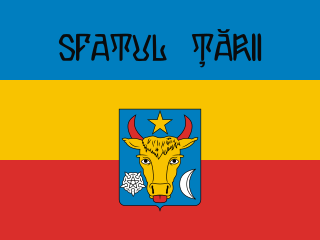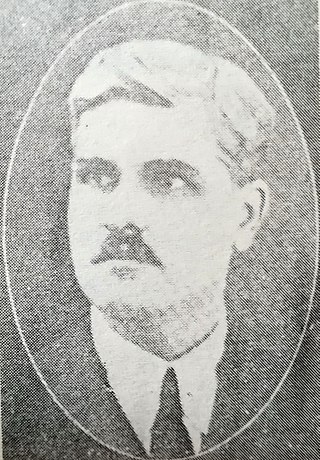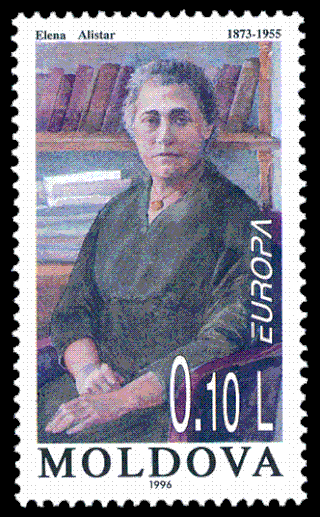Nicolae Ciornei | |
|---|---|
 Romanian politician | |
| Member of the Moldovan Parliament | |
| In office 1917–1918 | |
Nicolae Ciornei (born 1892, Toceni, Cahul County - died 20th century) was a Bessarabian politician.
Nicolae Ciornei | |
|---|---|
 Romanian politician | |
| Member of the Moldovan Parliament | |
| In office 1917–1918 | |
Nicolae Ciornei (born 1892, Toceni, Cahul County - died 20th century) was a Bessarabian politician.
He served as Member of the Moldovan Parliament (1917–1918). [1]
In 1917 at the end of March, in Odessa, Nicolae Ciornei, along with Captain Emilian Catelli, established the Progressive Party. Ciornei received from the organizing committee of the progressive Moldovan party the task of moving to all the headquarters and institutions of Odessa to explain to the Moldovan soldiers in their mother tongue the meaning of the events that took place and he immediately took action. At the beginning of April, at the meeting of the Moldovan delegates from the Odessa garrison, along with the seamen's delegates and the student delegates, the Executive Committee of the NMP, the Odessa section, was elected. Among the 18 people in the new committee headed by Captain Catelli are the second lieutenant Nicolae Ciornei.
On 14 May 1917 the Moldavian Soldierly Committee of Odessa was established, of which Nicolae Ciornei was also a member. At the beginning of the summer of 1917 such committees multiply and even arose a movement of the Romanian Bessarabian soldiers.
Nicolae Ciornei was named approximately in the beginning of July in an extraordinary commission for the investigation of the riots in Orhei County, following some disorders caused by the deserters. During the same period, through the care of the Soldierly Committee from Odessa formed cohorts of soldiers from Bessarabian soldiers to guard the military depots in Bessarabia. Together with other Bessarabian officers, second lieutenant Ciornei dealt with the organization of these cohorts. On 20 October 1917 the deputy, Nicolae Ciornei, was appointed by the congress of Moldovan soldiers as deputy in the Moldovan Parliament from Ismail County.
At the opening of the Sfatului Țării the deputy Nicolae Ciornei became the inspector of the cohorts. In the following days, he launched an order to change the name of cohorts to that of flying detachments. The Russian General Staff from Odessa orders them to report on the basis of which order he made this change, and Ciornei answers telegraphically: "The history of the nation has its motives and foundations". On such a response, the General Staff did not return with any other orders. On 11 January 1918, at a critical moment, Nicolae Ciornei, along with other soldiers, joined Captain D. Bogos in order to preserve the order in the disorder caused by Frontotdel, who, starting with the evacuation of Chișinău, wanted to destroy some buildings. [2]

Sfatul Țării was a council that united political, public, cultural, and professional organizations in the greater part of the territory of the Governorate of Bessarabia in the disintegrating Russian Empire, which was transformed into a Legislative body and proclaimed the Moldavian Democratic Republic as part of the Russian Federative Republic in December 1917, and then union with Romania in April [O.S. March] 1918.

Alexandru Baltagă was a Bessarabian Romanian Orthodox priest, a founder of the Bessarabian religious press in the Romanian language, a member of Sfatul Țării (1917–1918), a Soviet political prisoner, and, according to the Orthodox Church, a martyr for the faith.
Vladimir Cristi (1880–1956) was a Romanian publicist and politician who served as State Minister in the Nicolae Iorga government between 16 January and 6 June 1932. Cristi was Mayor of Chișinău between 1938 and 1940.

Nicolae N. Alexandri was a Bessarabian politician.

Constantin Vasilievici Bivol was a Bessarabian politician and agriculturalist, brother of the more famous politician Nicolae Bivol. Hailing from the ethnic Romanian community of Costești, he was born a subject of the Russian Empire, and saw action with the Imperial Russian Army in World War I. He was a soldiers' delegate to Sfatul Țării, the regional assembly of Bessarabia Governorate, after elections in November 1917; upon the proclamation of a Moldavian Democratic Republic, he veered toward Romanian nationalism, and promoted the Romanian vernacular against the linguistic pluralism championed by Bessarabia's ethnic minorities.

Teofil Ioncu was a Bessarabian and Romanian politician, member of Sfatul Țării.

Andrei Scobioală (1884–1971) was a Bessarabian politician, a professor of mathematics and a deputy in the Country Council between 1917-1919 and in the Parliament of Romania between 1928 - 1930.
Simeon Galeţchi was a Bessarabian politician.
Afanasie Chiriac was a Bessarabian politician.

Ion Văluţă was a Bessarabian politician.
Grigore Turcuman was a Bessarabian Romanian politician. As a member of Sfatul Țării, he voted the Union of Bessarabia with the Kingdom of Romania on 27 March 1918.

Gheorghe Tudor was a Bessarabian politician.

Anton Crihan was a Bessarabian politician, lawyer, author, economist, professor and journalist. He was a member of Sfatul Țării (1917), adviser to the Secretary of State for Agriculture in the General Directorate of the Republic of Moldova (1917), deputy in the Parliament of Romania, adviser to the Secretary of State at the Ministry of Agriculture and Domains (1932–1933), professor at the Polytechnic University of Iasi and at the Faculty of Agronomy in Chisinau (1934–1940).
Zamfir Munteanu was a Bessarabian politician.
Teodor Neaga was a Bessarabian politician.
Vasile Laşcu was a Bessarabian politician.

Elena Alistar-Romanescu was a Bessarabian physician and politician who was part of Sfatul Țării from Bessarabia.
Ion Popa was a Bessarabian politician.
Emanoil Catelli was a Moldavian politician.
Anton Novakov or Novacov was a Bessarabian industrialist and legislator of the Moldavian Democratic Republic, of Bulgarian and Gagauz background. He was originally active in the Russian Empire's Bessarabia Governorate, where he organized credit unions. In late 1917, the co-operative network elected him to the Bessarabian council, or Sfatul Țării, which proclaimed the Moldavian Republic in December. Novakov served on the Commission to Combat Anarchy and helped organize a republican militia. His absence during the vote on Bessarabia's unification with Romania in March 1918 was partly explained by his missions in the field, though allegations later surfaced that he had actively conspired against the union's recognition. He lived the remainder of his life in Romanian Bessarabia, and integrated into the political life of Greater Romania: originally a member of the People's Party, he subsequently became a National Liberal. In the late 1920s, Novakov was involved in a legal battle with the Romanian state, over benefits he claimed were owed to him as a former member of the Sfatul.